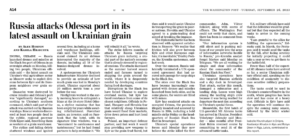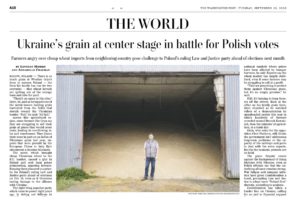As a result of the attack on Iran, nitrogen fertilizer at the port of New Orleans has seen an increase in price this week. Urea prices for barges in New…
Russia Hits Ukrainian Port Infrastructure For Second Night, as Black Sea Turmoil Persists
New York Times writers Victoria Kim and Matthew Mpoke Bigg reported today that, “Russian drones targeted southern Ukraine early Tuesday, hitting port infrastructure, warehouses and dozens of trucks near the Black Sea, after Ukraine increased attacks on Crimea in an effort to loosen Moscow’s grip on the south.
“The most consequential attack appeared to have been on Izmail in the Danube River delta, where two truck drivers were injured, dozens of trucks were damaged and port infrastructure and warehouses were affected, according to Oleg Kiper, the head of the regional military administration. Izmail is one of the main ports that Ukraine uses to ship grain from the Danube.”
Overnight, Russia continued its attacks on civilian sites – targeting transportation networks, grain storage, and ports in the Odesa region, Cherkasy region and Kryvyi Rih. Over 36 trucks were damaged or destroyed and truckers and port workers were injured. Yet again, in… pic.twitter.com/DZpByvbB9n
— Ambassador Bridget A. Brink (@USAmbKyiv) September 26, 2023
The Times article explained that, “It was the second day in a row of attacks on ports in the Odesa region. On Monday it was hit with missiles and drones that damaged a grain warehouse, a marine terminal and an abandoned hotel. At least two people were killed in the city of Odesa.”
Reuters writers Anna Pruchnicka and Lidia Kelly reported today that, “Russia hit Ukrainian port infrastructure and grain storage facilities in an overnight drone strike on the grain exporting district of Izmail, Ukrainian officials said on Tuesday.
“Oleh Kiper, governor of the southern Odesa region which includes the Danube River ports of Izmail and Reni, said a border checkpoint building, storage facilities and more than 30 trucks and cars were damaged, and that two people had been hurt.”
Meanwhile, Alex Horton and Kamila Hrabchuk reported in today’s Washington Post that, “Disruptions in the Black Sea have forced Ukraine to explore overland routes, but Kyiv has faced resistance from some of its closest neighbors. Officials in Poland, Hungary and Slovakia fear that relatively cheap Ukrainian grain would flood their markets, drive down prices and hurt local farmers.”

Also in today’s Washington Post, Loveday Morris and Annabelle Chapman reported that, “Across this agricultural region, some farmers like [Wieslaw Gryn, who farms in eastern Poland] say they are struggling to sell their grain at prices that would cover costs, leading to overflowing silos and warehouses. They blame their woes in part on an influx of Ukrainian grain last year, imports that were greenlit by the European Union to help Kyiv circumvent a Russian blockade.

“The move, which brought cheap Ukrainian wheat to the E.U. market, caused a glut in Poland and sent local prices plummeting, angering farmers. Keeping them placated is a priority for Poland’s ruling Law and Justice party ahead of elections on Oct. 15, even as it threatens lasting damage to the alliance with Ukraine.”
And in more detailed reporting of recent Ukrainian strikes in the Black Sea region, Associated Press writer Illia Novikov reported in today’s Los Angeles Times that, “The missile strike that blasted the Crimean headquarters of Russia’s navy last week killed 34 officers, including the fleet commander, Ukraine said Monday, though it provided no evidence to support its claim.
“Ukraine’s Special Operation Forces said on the Telegram messaging app that its strike on the main building of the Black Sea Fleet headquarters in the port city of Sevastopol had wounded 105 people. The claims could not independently be verified and are vastly different from what Russia has reported.”
The AP article added that, “The new death and casualty figures are a steep increase from what Ukraine’s intelligence chief, Kyrylo Budanov, told Voice of America on Saturday, when he said at least nine people were killed and 16 others wounded in the attack that left the building smoldering. He also said Alexander Romanchuk, a Russian general commanding forces along the key southeastern front line, was ‘in a very serious condition.’
“The new report indicates that the fleet’s chief, Adm. Viktor Sokolov, was also killed, though no supporting evidence was offered.”
Meanwhile, Dow Jones writer Kirk Maltais reported yesterday that, “Wheat futures on the CBOT led grains higher today, driven by reports of Russia attacking Ukrainian port and grain storage facilities.”
Elsewhere, Reuters writer Pavel Polityuk reported today that, “A cargo vessel set off from a Ukrainian Black Sea port on Tuesday after loading but remained close to the port, an industry source said, without giving any further details.
“The vessel was the latest to set off from a Ukrainian Black Sea port since Kyiv established a temporary ‘humanitarian corridor’ hugging the coastline following Russia’s decision to quit a deal that had allowed safe Ukrainian exports.
“Two bulk carriers left the port of Chornomorsk last week via the humanitarian corridor.”
Polityuk noted that, “Two other vessels were still in ports under loading.”
“The blockage of deep sea ports has already affected Ukrainian grain exports, which have decreased by 51% so far in September to 1.57 million tons from 3.21 million tons in the corresponding period last year,” the article said.





